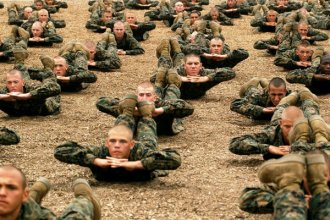
How to become Marine pilot?
 Questions on Joining the Marines
Questions on Joining the Marines
Questions About Basic Training
Questions on Becoming an Officer
Questions on Joining the Reserves
Marine Corps Aviation
Next Steps
The Marine Corps is one of the most elite fighting forces in the world. The Marines are a part of the Department of the Navy and operate in close cooperation with U.S. Naval forces at sea. The Marine Corps' mission is unique among the services. Marines serve on U.S. Navy ships, protect naval bases, guard U.S. embassies, and provide an ever-ready quick strike force to protect U.S. interests anywhere in the world.
To perform the many duties of the Marine Corps, approximately 174, 000 officers and enlisted Marines fly planes and helicopters; operate radar equipment; drive armored vehicles; gather intelligence; survey and map territory; maintain and repair radios, computers, jeeps, trucks, tanks, and aircraft; and perform hundreds of other challenging jobs.
How are the Marines different from the Army?
The Marine Corps is the nation's 911 force. Thousands of Marines are always deployed aboard naval amphibious ships ready to respond to an international crises. This ability to mobilize quickly has allowed the Marines to become the United States' ready-reaction force.
The Army on the other hand is a much larger force and is used in larger and longer conflicts. At times, the Army will relieve the Marines after a period of time, much like what happened in Somalia.
The Marines also consider themselves to be a self-sustaining force bringing with it to battle its own air power, artillery and logistics support. Of course, Marines have to travel on Navy vessels in order to to get to its destination.
Marines also are proud to say that 'every Marine is a rifleman.' In other words, regardless if you are in the infantry, the air wing or a computer technician, you will given the proper training so that, if need be, you can perform as an infantryman if called upon. It is fair to say that this mentality does not exist in all of the aU.S. Army's support units.
The following are the basic requirements for joining. You must:
- To enlist, you must be a U.S. citizen or a resident alien.
- Meet exacting physical, mental, and moral standards.
- Be between the ages of 17-29. Seventeen-year olds need parental consent.
- Have a high school diploma.
- Pass a Military Entrance Processing Station medical exam.
- Women are eligible to enlist in all occupational fields, with the exception of combat arms specialties: infantry, artillery, and tank and amphibian tractor crew members.
The ASVAB is a test that measures your aptitudes. It consists of ten short individual tests covering word knowledge, paragraph comprehension, arithmetic reasoning, mathematics knowledge, general science, auto and shop information, mechanical comprehension, electronics information, numerical operations and coding speed. When you take the ASVAB prior to enlisting, not only do you receive scores on each of these individual tests, but several individual test results are combined to yield three academic composite scores: verbal, math and academic ability.
Officer candidates who did not receive a minimum score on the SAT or the ACT must take the ASVAB and score a minimum of 115 on the Electronics Repair composite.
- Steady Income: You are paid twice a month, on the 1st and 15th, every month, based on your pay grade and service requirements.
- Advancement: You are promoted based on job knowledge, your performance, time in pay grade and service requirements.
- Paid Vacation: You earn 2.5 days paid vacation per month for a total of 30 days each year up to 60 days.
- Training: You choose your career path based on your aptitude, physical abilities, security clearance, motivation and determination.
- Health Care: While on active duty, you will receive complete medical and dental care at no cost.
- Life Insurance: Active duty members select up to $200, 000 in term life insurance for $18 per month.
- Allowances: You may also receive additional tax-free money for Basic Allowance for Housing (BAH) if government housing is not available; Basic Allowance for Subsistence (BAS), if government food facilities are not available in the area you are stationed; and a uniform allowance (for enlisted personnel only) to help maintain your uniform.
- Tax Advantage: Only your basic monthly pay is subject to Federal or State income tax.
- GI Bill: The Montgomery GI Bill will help pay for college education or vocational training.
- Tuition Assistance: While on active duty, you may continue your education, and may be helped in defraying the cost of college-accredited courses.
- Additional Benefits: There are exchange and commissary privileges, moving allowances, temporary lodging expenses, travel, survivor benefits, Veterans Administration home loans and more.
Although the Marine Corps says that "every Marine is a rifleman, " infantry units comprise no more then 15% of the service's total force. You will be able to work in one of 35 career fields which offer over 300 different jobs.
Some specialty fields available to you:
- Aircraft Defense
- Aircraft Maintenance
- Armor
- Broadcasting
- Combat Engineer
- Communications
- Computer Operator/Technician
- Electronics
- Intelligence
- Supply









